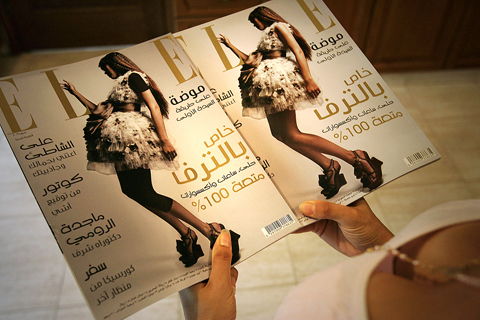France-based women’s magazines Elle and Marie-Claire are continuing a push into the Arab market, but say adapting content to local sensitivities without contradicting their own ideals is not easy.
Marie-Claire has editions in Kuwait and the United Arab Emirates (UAE) and last week launched a monthly in Saudi Arabia, where competitor Elle magazine is already present, as well as in Dubai and Lebanon.
But the just-released 35,000 copies of the Saudi edition of Marie-Claire ran into immediate, if minor problems. A story on Saudi women’s football, in which players are clad in trousers, long sleeves and headscarves, was allowed in full in Jeddah but not Riyadh.

PHOTO: AFP
“Our problem is reconciling local culture with the Marie-Claire concept, which is no piece of cake,” said Laurence Hembert Wermus, who heads international development for the magazine, a touch less glam than rival Elle.
“Given the economic context, there’s no point in launching new magazines in France, but publishers can develop editions internationally, and the Middle East is definitely a growth market,” said Sophie Renaud, who runs the media consultancy Carat France.
Yet in many of these new markets, it remains impossible to run photographs of naked women or stories on a gamut of sexual practices.
Last April, the French-language Africa newsweekly Jeune Afrique was banned in the UAE because of a cover picture showing a naked woman’s back to illustrate a feature story on “Muslims and Sex.”
So for these magazines that back feminist causes, taking root in the Arab world without negating their ideals is tricky.
“We are very careful not to provoke uselessly, we don’t want to be banned. It would neither help social progress nor the status of women,” said Jean de Boisdeffre, who heads the international media arm of Elle owner-company, Lagardere Active.
The magazine, for example, refrained from running a story on French President Nicolas Sarkozy’s call to ban the burqa.
Publication of pictures varies from country to country, said Marie Claire’s international editorial manager, Florence Duluard.
“In the Emirates we avoid pictures on the fashion pages of girls in very mini skirts or necklines that plunge to their navels. In Arabia it’s even stricter — no necklines and no knees.”
Both magazines have hired local journalists to provide content with a brief to highlight local designers and issues as well as the big-name fashion labels so popular in the Middle East.
“They know how to broach a subject,” Boisdeffre said, adding that 80 percent of the magazine was formulated in the region.
“We do talk about problems in couples or women who are depressed,” editorial manager Florence Duluard said. “But we never tackle these issues head-on — we take them on sideways, like asking ‘how to take a positive approach to the couple?’ instead of stating that a woman has problems because her husband doesn’t satisfy her.”

When Shanghai-based designer Guo Qingshan posted a vacation photo on Valentine’s Day and captioned it “Puppy Mountain,” it became a sensation in China and even created a tourist destination. Guo had gone on a hike while visiting his hometown of Yichang in central China’s Hubei Province late last month. When reviewing the photographs, he saw something he had not noticed before: A mountain shaped like a dog’s head rested on the ground next to the Yangtze River, its snout perched at the water’s edge. “It was so magical and cute. I was so excited and happy when I discovered it,” Guo said.

TURNAROUND: The Liberal Party had trailed the Conservatives by a wide margin, but that was before Trump threatened to make Canada the US’ 51st state Canada’s ruling Liberals, who a few weeks ago looked certain to lose an election this year, are mounting a major comeback amid the threat of US tariffs and are tied with their rival Conservatives, according to three new polls. An Ipsos survey released late on Tuesday showed that the left-leaning Liberals have 38 percent public support and the official opposition center-right Conservatives have 36 percent. The Liberals have overturned a 26-point deficit in six weeks, and run advertisements comparing the Conservative leader to Trump. The Conservative strategy had long been to attack unpopular Canadian Prime Minister Justin Trudeau, but last month he

Chinese authorities said they began live-fire exercises in the Gulf of Tonkin on Monday, only days after Vietnam announced a new line marking what it considers its territory in the body of water between the nations. The Chinese Maritime Safety Administration said the exercises would be focused on the Beibu Gulf area, closer to the Chinese side of the Gulf of Tonkin, and would run until tomorrow evening. It gave no further details, but the drills follow an announcement last week by Vietnam establishing a baseline used to calculate the width of its territorial waters in the Gulf of Tonkin. State-run Vietnam News

PROBE: Last week, Romanian prosecutors launched a criminal investigation against presidential candidate Calin Georgescu accusing him of supporting fascist groups Tens of thousands of protesters gathered in Romania’s capital on Saturday in the latest anti-government demonstration by far-right groups after a top court canceled a presidential election in the EU country last year. Protesters converged in front of the government building in Bucharest, waving Romania’s tricolor flags and chanting slogans such as “down with the government” and “thieves.” Many expressed support for Calin Georgescu, who emerged as the frontrunner in December’s canceled election, and demanded they be resumed from the second round. George Simion, the leader of the far-right Alliance for the Unity of Romanians (AUR), which organized the protest,